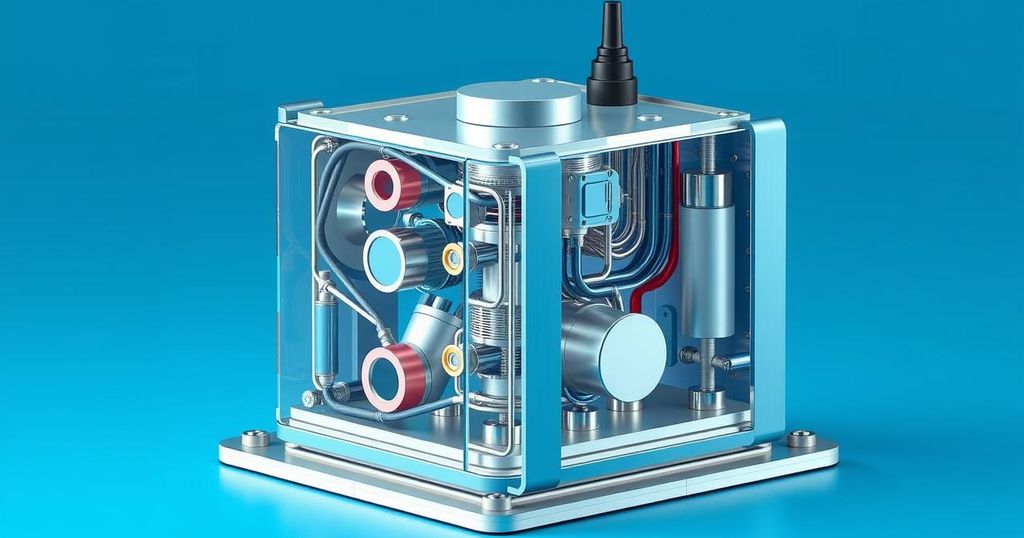Companies
BRAZIL, CENTER FOR MATERIALS SCIENCE AND TECHNOLOGY, ENERGY, EXPORT, FINANCIER OF STUDIES & PROJECTS, FINEP, FINEP – FINANCIADORA DE ESTUDOS E PROJETOS, INDUSTRY, INSTITUTO DE ENGENHARIA NUCLEAR, JE, JESUALDO LUIZ ROSSI, MINING, RENEWABLE ENERGY, RIO DE JANEIRO, SAO PAULO, SOUTH AMERICA
Jamal Walker
0 Comments
Brazil Advances Microreactor Project for Sustainable Energy Solutions
Brazil’s National Nuclear Energy Commission is advancing a microreactor project aimed at reducing diesel generator reliance. Supported by funding from Finep, IPEN and IEN will collaborate on research, development, and assembly of the microreactor. This three-year initiative seeks to create a sustainable energy solution for isolated regions, with a focus on local material production and innovation in nuclear technology.
Brazil’s National Nuclear Energy Commission (CNEN) is advancing a microreactor project, aimed at decreasing reliance on diesel generators. This initiative will supply energy to small cities, hospitals, factories, and remote areas. The development is supported by CNEN through its branches: the Institute of Energy and Nuclear Research (IPEN) in Sao Paulo and the Institute of Nuclear Engineering (IEN) in Rio de Janeiro.
The project garnered approval and funding from the Financier of Studies & Projects (Finep). IPEN will oversee the research and development of essential materials for the microreactor, while IEN will manage the assembly of a subcritical unit, a model of nuclear reactor that does not sustain a chain reaction.
IPEN’s focus includes developing the materials such as beryllium oxide and graphite as moderators and boron carbide for control rods, with an emphasis on local production to assure availability. The institute also aims to innovate nuclear fuel, particularly larger diameter uranium dioxide (UO2).
Researcher Jesualdo Luiz Rossi commented on the significance of studying different moderators, emphasizing IPEN’s historical work with beryllium, dating back to the 20th century, and the need to re-establish expertise in the field. The institute plans to construct new facilities to safely handle toxic materials.
IEN will continue its subcritical unit research that began in the 1970s, which was reactivated in 2018. Francisco Jose de Oliveira Ferreira, head of IEN’s Nuclear Engineering Division, stated that the institute has conducted numerous studies and possesses the necessary equipment to build the unit.
A key goal for IEN is to assess neutron behavior within the reactor and validate theoretical predictions through experimental studies. Enhancements in instrumentation are also anticipated to leverage IEN’s substantial experience in this area.
Spanning three years, the microreactor project has a total budget of BRL50 million (approximately $8.8 million), primarily funded by Finep. It is led by Diamante Geração de Energia, INB, and Terminus Pesquisa e Desenvolvimento em Energia alongside multiple prestigious Brazilian universities and institutions, such as the Federal University of ABC and the National Institute of Telecommunications.
The objective is to design a low-power nuclear microreactor system that generates approximately 3 MWe and can operate remotely for over a decade without refueling. CNEN emphasized the project’s national focus, distinguishing it from foreign initiatives, such as Westinghouse’s microreactor in Canada.
Professor Joao Moreira, the project’s technical coordinator from UFABC, stated that this microreactor represents an original development, grounded in Brazil’s technical and industrial capabilities. Project coordinator Adolfo Braid highlighted IPEN’s crucial role, particularly in the supply chain aspects of the reactor’s construction.
The project encompasses the manufacturing of vital components like the reactor core and passive heat transfer systems, including heat pipes essential for stabilization. Innovations in engineering will be necessary for the heat pipe system’s reliability.
Currently, the project is at Technology Readiness Level (TRL) 3, engaged in mathematical modeling and preliminary studies, with the aspiration to reach TRL 6, indicating demonstration of the technology in relevant environments. Management challenges are anticipated, especially in coordinating various institutions, necessitating real-time task management software for efficiency.
In summary, Brazil’s microreactor initiative represents a significant step towards autonomy in energy generation. Through the collaboration of CNEN, IPEN, and IEN, the project aims to innovate in nuclear energy, reducing diesel dependency while addressing a national energy need. The efforts reflect Brazil’s commitment to developing indigenous technologies while enhancing safety and efficiency in energy production, with future expectations for operational deployment.
Original Source: www.neimagazine.com




Post Comment